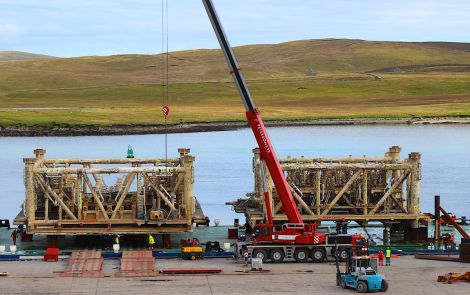News / Isles mustn’t miss out on decommissioning
POLITICIANS and industry figures say decommissioning work presents an opportunity that Shetland cannot afford to miss over the next decade and beyond.
A new report launched by Oil & Gas UK on Tuesday entitled Decommissioning Insight 2016 forecasts a “gradual but steady” rise in offshore oil and gas decommissioning in the UK and Norway in the next 10 years. The decommissioning market was worth over £2 billion in 2015.
It is the first survey of both the UK and Norwegian markets, and showed growth of half a billion pounds between 2014 and 2015 – representing some five per cent of total industry expenditure compared with only two per cent in 2010.
Lerwick Port Authority (LPA) has spent recent years gearing up for the challenge and its chief executive Sandra Laurenson said she was “certain that decommissioning will become an increasingly important part of the port’s business in years to come”.
With many oil and gas companies retrenching after the price of a barrel plummeted to below $50, she expects a lot of decommissioning won’t take place until early in the next decade.
“With the increasing age of platforms in the northern North Sea, and depletion of the remaining reserves of those fields, more fields are ceasing production,” she said.
“However, many of these fields will not enter the decommissioning phase until the 2020s given the shortage of capital in the sector at this time.
“The largest part of the spend on decommissioning is offshore with platforms being prepared for removal and plugging and abandoning of wells. This will provide continuity of offshore work for some trades.
“The proportion of decommissioning spend that is for onshore disposal is 2-3 per cent of the total cost. Decommissioning is a good fit for Shetland with the relatively small numbers of people required to dismantle the items brought ashore.”
Become a member of Shetland News
Laurenson added: “Lerwick has a track record of decommissioning over the past decade. The yard at Greenhead remains busy with subsea decommissioning as major platform removal contracts are sporadic.”
‘Significant expertise’ in isles already
Shetland MSP Tavish Scott and Northern Isles MP Alistair Carmichael both called for the isles to seize the opportunities presented by the impending shutdown of oil fields and platforms.
Scott said the islands were “well placed” to win decommissioning work. “We have already lost work to Norway and need to make sure that doesn’t happen with future contracts,” he said.
“This week representatives of Scottish ports including LPA will be in Holyrood. That is a useful time to consider what more can be done to make Shetland the most attractive place to win this work given our closeness to the northern North Sea oil rigs.”
The MSP added that he was still waiting for the SNP administration to publish an action plan: “It’s time the Scottish Government recognises the real opportunities decommissioning can bring and tells us how it will support industry to keep work in Scotland.”
Carmichael, meanwhile, said “significant expertise” already existed in Shetland while Orkney was also “exploring the opportunities”, and he called on the UK and Scottish governments to work together to support the growing sector.
“Spending on decommissioning is expected to be around £17.6 billion between now and 2025,” he said. “This is a huge market which could support hundreds of much-needed jobs in the North Sea, and Northern Isles.
“For decades the oil and gas industry has been a source of high quality well-paid jobs. That will not last forever, but the decommissioning of assets could provide jobs for some years to come. Some of the skills are transferable.”
Over 100 platforms to be removed
Oil & Gas UK’s “upstream policy director” Mike Tholen said the industry was “not witnessing a rush to decommission” despite the continuation of low oil prices.
“Different factors are at play and the picture is much more complex,” he said. “Some companies are deferring cessation of production as field life has been extended by sustained efficiency improvements; others are delaying activity due to cash-flow constraints; while elsewhere, companies may be expediting decommissioning to take advantage of falling costs in the current downturn.”
While 52 new projects appear for the first time in this year’s report, most have been “a long time in the planning”, while more than 100 platforms are forecast for complete or partial removal from the UK and Norwegian continental shelves.
Tholen said the UK supply chain would “need to focus on developing a high-quality, cost-efficient and competitive decommissioning capacity to make the most of the opportunity and provide a range of goods and services that can not only be deployed in the UK but also exported overseas”.
Become a member of Shetland News
Shetland News is asking its readers to consider paying for membership to get additional perks:
- Removal of third-party ads;
- Bookmark posts to read later;
- Exclusive curated weekly newsletter;
- Hide membership messages;
- Comments open for discussion.
If you appreciate what we do and feel strongly about impartial local journalism, then please become a member of Shetland News by either making a single payment, or setting up a monthly, quarterly or yearly subscription.




























































